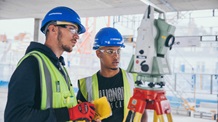Why ex-military have a part to play within the built environment
Having spent over thirty years in the Royal Marines, Terry Price knows a thing or two about the skills a person picks up in the military. Now, as the lead for the Mace Military Programme (MMP), which supports service leavers, veterans and reservists, he’s putting his experience to good use in the construction sector, helping them find their next adventure.
Here, Terry explains why people with military backgrounds are so highly valued in the built environment.
The synergies between roles and requirements in the military and the construction sector are many and consequential. That’s why Mace has been growing its veteran and reservist community at pace over the past five years - and why we know there are many benefits to be had by employer and employee.
Construction ‘fits’
The breadth of roles available within construction, including traditional construction activities as well as a range of consultancy services, means there’s a role suitable for anyone leaving the military – that’s a good start. At Mace, we welcome everyone who shares our values, regardless of background, culture, disability, ethnicity, gender or sexual orientation. And just like the armed forces, we want to create opportunities for all our people to excel and ensure they always do the right thing.
Critically, service background and rank are not top of the list when it comes to selecting people for roles, which means many of the ‘barriers’ people expect to face simply don’t exist. What recruiters look for most runs deeper. Our industry is more interested in a candidate’s values and how their overall ethos aligns with the strategic priorities of the organisation they want to join.
Ex-military personnel are used to making a tangible difference through their work. They’re motivated by making the world and its people safer. Translate those values into the construction sector and the alignment is clear: whether its ensuring colleagues go home safe and well or creating a more connected, resilient and sustainable world – the impact one can have in our sector feels real.
Skilled and adaptable team players
The skills possessed by people with a military background are exceptional in their standard and scope. This is largely a by-product of the rigorous training they go through to enable them to carry out military operations at any given moment.
This training embeds a mentality of ‘question, learn, adapt’ – essential for service personnel who often must improvise to overcome unexpected, complex and pressurised scenarios. Improvisation drives innovation and we need more of both in the construction industry; it’s a compelling proposition to any prospective employer.
Neatly aligned to this, ex-military personnel are realistic and pragmatic problem solvers who want to ‘get stuff done’. This allows them to grasp the scale of a challenge, plan an appropriate solution, and honestly manage client expectations. Over-promising – a common challenge across supply chains in the construction industry – does not marry with the military ethos.
What does resonate, however, is textbook leadership. ‘Leadership at all levels’ is something I often speak about with ex-military colleagues. If a service leaver can show they’re a leader, irrespective of their job grade, it creates trust and translates into early responsibility. I can’t overstate the importance of quickly building a reputation as someone who is not only capable, but dependable – veterans and reservists have all the ingredients to succeed in the built environment sector.
In our experience, veterans inherently understand that a leader doesn’t exist without a team, and that’s important in construction, where pulling in the same direction as those around you is non-negotiable. Research by BuildForce and the Chartered Institute of Building has found that, of all the skills ex-military personnel bring to the construction industry, working well in a team is the most valued.
Mace is a people-focused organisation; a team of like-minded colleagues with a genuine desire to do what’s right. It is the strength of our people working together that drives our success. That’s why we’re such a good fit for veterans and reservists and why we welcome more of them into our team.
Working with partners
With around 15,000 men and women leaving the British military each year, you’d think recruitment is like fishing in a barrel, but it’s not so straightforward.
There is, naturally, a considerable amount of apprehension for service leavers when looking for a new role. Even though the MMP provides a tailored recruitment approach and continued support for successful candidates once they join us, we still rely on the help of organisations like BuildForce to identify good people and promote the huge variety of opportunities on offer. While there is certainly a gap between the recruitment opportunity and reality, it is this sustained collaboration that is making a difference.
We don’t need wholesale change, rather a continuation and incremental improvement of what the industry is doing. The message is landing, and the ex-military talent pool is increasingly flowing our way.












